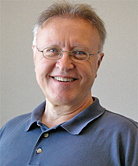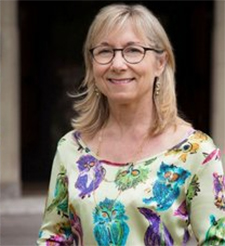Building on the early success of its pilot projects this fall, the Globally Networked Learning (GNL) project at York will hold drop-in sessions on Nov. 9 and Nov. 16 (https://yorkinternational.yorku.ca/gnl-2/), with the hope of interesting more faculty members in integrating a transnational and intercultural experiential GNL activity into their courses.

James Simeon
Students in Professor James Simeon's fall semester course, the International Refugee Protection Regime I: Critical Problems, began clamouring for a second GNL opportunity immediately after finishing their first remote joint assignment with university students from Mexico and Ecuador.
"My students thought it was great," said Simeon, head of York University's McLaughlin College and an associate professor in the School of Public Policy and Administration. "They've already been invited to visit the other countries and broadened their networks."
Globally networked learning refers to an approach to teaching and learning that enables students and faculty based in different locations worldwide to participate in and collaborate on knowledge-making processes. They engage in joint lectures and class discussions, assignments or research projects through innovative pedagogies. The partnerships are supported by online communication and information technologies.
In other words, GNL provides hands-on opportunities for students to learn how to collaborate with individuals from a different culture. Currently, with classes being delivered remotely due to public health and travel restrictions, GNL projects also let students learn how to collaborate via online platforms, similar to the way a team of colleagues works in an international company.
Students aren't the only ones who benefit from GNL opportunities; faculty members also have much to gain.
"GNL was a great opportunity to meet like-minded faculty members," said Charles-Antoine Rouyer, a course director for Glendon College's Department of Multi-Disciplinary Studies. "It was like a mini-conference, with a focused hands-on deliverable, in this case collaborating on an online workshop on health and well-being."
Rouyer collaborated with faculty from universities in Costa Rica and the United States to fine tune the Costa Rican duo's workshop, part of a series being offered by the Hemispheric Universities Consortium (thehuc.org). He gave students in his Communication, Health and Environment course the opportunity to participate in the workshop and do the related assignments for extra credit; six of the 125 took part.
"GNL provided an additional course activity for some students in my course, very valuable as a learning experience, especially in times of remote synchronous teaching," said Rouyer. "It is a way as an instructor to get to know these students better and help them in their learning journey."
With York University courses all being delivered remotely during the pandemic and exchange programs on hold, it's a perfect time for faculty members to consider building a globally networked learning component into their syllabuses.

Dominique Scheffel-Dunand
"It's an excellent alternative to exchange programs," said Dominique Scheffel-Dunand, an associate professor of French studies at the Faculty of Liberal Arts & Professional Studies, who initiated York's involvement with GNL in 2015 with an Academic Innovation Fund (AIF) grant to explore how to scale and institutionalize this approach to internationalizing the curriculum. "It's a new alternative pedagogical approach enabled by digitally networked technology."
Scheffel-Dunand is joined on the GNL project team, by Helen Balderama, associate director of international programs and partnerships for York International, and Lisa Endersby, an educational developer with Teaching Commons. While Scheffel-Dunand explores new learning environments and possibilities for GNL and arranges for the necessary library and information technology assistance, Balderama and Vinitha Gengatharan, executive director of York International, assist faculty in connecting with the right international partners from among the University's more than 300 connections. Endersby's focus is helping participating faculty to create learning activities that meet specific outcomes.
"I help faculty develop innovative pedagogical strategies around helping students develop intercultural competencies," said Endersby. "We are living in an interconnected society and intercultural skills are of increasing importance. GNL helps York faculty and students learn how to communicate, connect, learn and teach with people who aren't just like them.
"They realize that to be successful, there is something to be said for a broader, more diverse understanding of the world. It's eye-opening, according to the feedback we get."
Eight York courses being offered during the 2020-21 academic year, including Rouyer's and Simeon's, have already been chosen as GNL pilot projects and others will also have a chance to take part
The courses in the 2020-21 GNL pilot project - four on the Glendon campus - are:
- International Refugee Protection Regime I: Critical Problems
- International Refugee Protection Regime II: Research Seminar
- Communication, Health and Environment
- Global Health Policy: Politics and Power
- Spanish Linguistics
- Individual Study in Linguistics
- Teaching English as an International Language
- Economics
Faculty and students are working with partners in diverse locations: Brazil, Colombia, Costa Rica, Ecuador, France, Germany and Mexico. In fact, Simeon is so taken with the idea that he has built GNL opportunities into two of his courses.
All of the project team members strongly believe in the intrinsic value of GNL - for all kinds of courses and in all fields.
"There are many new possibilities to explore," Scheffel-Dunand said. "We want faculty to consider having these transnational teaching and learning experiences a priority and build a course around them, rather than vice-versa."
Balderama, of York International, agreed that one of the strengths of GNL is its support for student-centred learning. Another, she said, is its development of 21st century global competencies among both students and instructors.
"As our world grows more interconnected, competencies such as flexibility, adaptability, openness to others' perspectives, intercultural communications - life skills - and information and media literacy are required for us to thrive and succeed in becoming globally aware and engaged individuals," Balderama said.
Simeon says GNL provides a rich learning experience and it's time for fellow York faculty to hop on the bandwagon.
"I'm pretty well sold on it," Simeon said. "One benefit of the pandemic is that there are accelerated opportunities for GNLs. All universities are putting in more resources and investing in technology that allows us to do this. It really opens the door to collaborative efforts.
"Students will be looking for these opportunities," he added.
Scheffel-Dunand believes it gives students a competitive advantage.
"Students want those experiences because they interest employers," she said. "Research has indicated that students with international mobility experiences and a global mindset are more attractive to employers and are more successful in their career development in the long term."
Don't miss the opportunity for support in building GNL into your own courses. Connect with the GNL Team and attend one of the upcoming GNL drop-in sessions. There will be sessions on both Nov. 9 and 16 from 10 to 11:30 a.m.
To learn more, visit the GNL website for more details and to register.
By Elaine Smith, special contributing writer.
This story was originally featured in YFile, York University's community newsletter.













